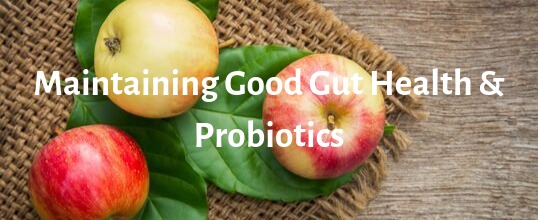You might think “bacteria yuck!”, but don’t worry, not all bacteria are bad for you! Most of the bacteria in your gut is quite harmless and are considered beneficial; they can aid in digestion and nutrient absorption. They may even affect your mood, immune system, and metabolism.

Your gut contains hundreds of different types of microorganisms (or microflora), including bacteria, yeasts, and viruses (the majority being bacteria). It is estimated that a healthy gut contains 100 trillion of these microorganisms, representing more than 500 different species. Each person’s gut flora (microbiota) is unique, like a fingerprint. It’s partly determined by your mom’s microbiota and partly from your eating and lifestyle habits.
Consuming probiotics may help boost the numbers of these “good bacteria” in your gut. Probiotics (meaning "for life") are live microorganisms intended to have health benefits by maintaining or improving normal gut flora when consumed in adequate amounts. They can help decrease the number of pathogens (harmful microorganisms) in your gut that can cause infections or inflammation.
A great deal of research has been done on probiotics, but more research needs to be done to understand if they are helpful and safe for various health conditions. There is evidence to suggest that probiotic supplements can help with antibiotic-associated diarrhea. They can help replace the body’s “good bacteria” that has been lost such as when you take antibiotics, which can kill both the “good bacteria” and the harmful ones, often leading to gastrointestinal issues. Probiotics also are thought to help with the symptoms of irritable bowel syndrome (IBS). Other studies note benefits against Crohn’s disease and ulcerative colitis (inflammatory bowel diseases). Though more research is necessary, some evidence suggests that certain probiotic strains can help people lose weight. Probiotics may also improve heart health, immune function and symptoms of depression and anxiety.
Probiotics are found almost everywhere today and may be found in supplement form (capsules, tablets, powders and even liquid extracts). You can find these over the counter in your local supermarket, drug store, health food store, and vitamin shops. You can find probiotics naturally in fermented foods such as yogurt and kefir, a yogurt-like drink. You can also find probiotics in That’s it. Probiotic Bars (yum!). There are also other non-dairy foods which also have beneficial cultures, including pickled vegetables called kimchi, sauerkraut, some pickles, tempeh, miso and non-dairy yogurts. Becoming more popular now is kombucha, a fermented tea that is rich in probiotics. Fermentation is “the chemical breakdown of a substance by bacteria, yeasts, or other microorganisms, typically involving effervescence and the giving off of heat”. Fermentation in foods using natural processes not only increases the food’s nutrient value and shelf life but can also provide a healthy dose of probiotics. Be aware though that not all products that have been fermented contain probiotics. To ensure a fermented food does contain probiotics, look for “naturally fermented” in the product’s label. It means that live organisms were used for fermentation (for example, live organisms and not vinegar were used for pickling). You can also look for the effervescence or bubbling of the liquid when you open the product; it means that there are live organisms in the product.
Of note, there is a wide range of probiotics, but they are not all the same. They come in different groups, each group contains different species and each species has many strains. The most common groups of probiotics are Lactobacillus and Bifidobacterium. The probiotics naturally found in your intestines include Saccharomyces boulardii (a yeast) and bacteria in the Lactobacillus and Bifidobacterium families. All these probiotics, however, address different health conditions. Health benefits are strain-specific, and not all strains are necessarily useful. For example, certain species and their strains of E. coli and Streptococcus can be harmful to the body while others can be probiotics that can be of benefit.
Probiotics should not be confused with prebiotics. Prebiotics are natural, non-digestible food components (typically high-fiber foods) that are thought to promote the growth of “good bacteria” in your gut. You can consider prebiotics as the fuel for your probiotics as prebiotics are fermented by these beneficial bacteria. When together they work in synergy, a process known as synbiotic. Prebiotics include fructooligosaccharides, such as inulin and galactooligosaccharides. You can find prebiotics by eating more fruits, vegetables, and whole grains (ex: bananas, asparagus, onions, chicory root, garlic, etc.).
Probiotics in foods and supplements are generally well tolerated and considered safe for most people because probiotics already exist naturally in the body. However, if you have a medical condition, consult with your doctor before taking a probiotic supplement. As I mentioned before, each person’s gut flora is partly determined by your eating and lifestyle habits, so consuming a healthy diet and exercising have the greatest impact in maintaining a healthy gut. Otherwise, if you keep with unhealthy lifestyle behaviors, probiotics might not provide many benefits. For a healthy snack, consider a That's it. Probiotics Bar with probiotics and prebiotics. You can also start your morning with yogurt parfait with banana or include a side of kimchi with your stir-fry at lunch for a healthy meal that includes both prebiotics and probiotics. Incorporating these functional foods into your diet will aid in creating a healthier you and a healthy gut.

